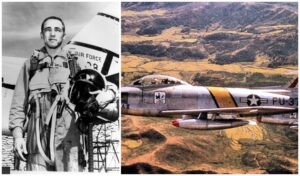“When Push Came to Shove”
This article written by John L. Frisbee, Contributing Editor of Air Force Magazine, was first published in December of 1983.
 Deep over North Korea, Robbie Risner’s wingman was hit by flak that disabled his F-86. Getting him to safety called for heroic measures. Brig. Gen. Robinson Risner’s heroism during seven and a half years of imprisonment and torture in North Vietnam is legendary.
Deep over North Korea, Robbie Risner’s wingman was hit by flak that disabled his F-86. Getting him to safety called for heroic measures. Brig. Gen. Robinson Risner’s heroism during seven and a half years of imprisonment and torture in North Vietnam is legendary.
Less known is the fact that he was a jet ace in Korea with eight confirmed victories. Few are aware, at least in detail, of an incredible feat of flying performed over North Korea by Robbie Risner in an attempt to save the life of another pilot. That courageous act is dismissed with a couple of sentences in Risner’s book, The Passing of the Night.
Risner’s career as a fighter pilot began in Panama, where he whiled away the World War II years. When peace came, he joined the Oklahoma Air Guard. His squadron was called to active duty during Korea and began transitioning from P-51s to F-80s but with no immediate prospects of getting into the war. With the bare required minimum of 100 hours of jet time, Risner volunteered for combat duty as a photorecce pilot, arriving in Korea on May 10, 1952. Three weeks later, he wangled his way into the famous 4th Fighter Wing at Kimpo and into F-86s, the world’s best fighter at that time. On Sept. 21, the fast-learning Captain Risner became our 20th jet ace.
A few weeks later while escorting fighter–bombers in an attack on a chemical plant along the Yalu River, Risner tangled with what he describes as the finest fighter pilot he ever encountered. From 30,000 feet to the deck they went, with Risner scoring several solid hits, then across the Yalu into forbidden territory and down the runway of a Chinese airfield where the damaged MiG-15 crashed. All the while, Robbie’s wingman, Lt. Joe Logan, stayed with the fight, protecting his leader.
As they climbed back across the Yalu near Antung, Logan’s F-86 took a burst of flak. Fuel and hydraulic fluid poured out the belly of his aircraft. With only five minutes’ fuel left, he would, it seemed, have to bail out in enemy territory. But Robbie Risner was not about to lose a fine wingman who was also a close friend.
“A typical fighter pilot,” says General Risner, “thinks less about risk than about his objective,” and Risner’s objective was to keep Joe Logan out of enemy hands. Jet ace Risner immediately embarked on an undeniably high-risk venture to achieve that objective. The Air Force had a rescue detachment at Cho Do Island, about 60 miles to the south—and with plenty of flak en route. Risner decided to try something that, to his knowledge, had never been done successfully before. He would push the damaged F-86 to Cho Do, where Logan could bail out safely.
Risner told Logan to shut down his engine, now almost out of fuel. Then he gently inserted the upper lip of his air intake into the tailpipe of Logan’s F-86. “It stayed sort of locked there as long as we both maintained stable flight, but the turbulence created by Joe’s aircraft made stable flight for me very difficult. There was a point at which I was between the updraft and the downdraft. A change of a few inches ejected me either up or down,” Risner, now retired and living in Austin, Texas, recalls.
Each time Risner re-established contact between the battered nose of his F-86 and Logan’s aircraft was a potential disaster that was made even more likely by the film of hydraulic fluid and jet fuel that covered his windscreen and obscured his vision. It was, one imagines, something like pushing a car at 80 miles an hour down a corduroy road in a heavy fog.
Miraculously, Risner nudged Joe Logan’s F-86 all the way to Cho Do, maintaining an airspeed of 190 knots and enough altitude to stay out of range of automatic weapons. Near the island, Logan bailed out, landing in the water near shore. Ironically, Risner’s heroic effort ended in tragedy. Although Logan was a strong swimmer, he became tangled in his chute lines and drowned before rescuers could reach him. But the measure of a heroic act lies not in success. It lies in the doing.
After Korea, Robbie Risner’s Air Force career continued to be marked by acts of physical and moral courage, culminating in his leadership of American POWs during those long years in Hanoi’s prisons. The standards of valor, loyalty, and dedication he set for himself, and met superbly throughout his years in uniform, have established a goal to be sought by generations of airmen yet to come. ■
There have been many requests over the years to rerun some of author Frisbee’s earliest “Valor” pieces. This one was first published in December 1983.”
